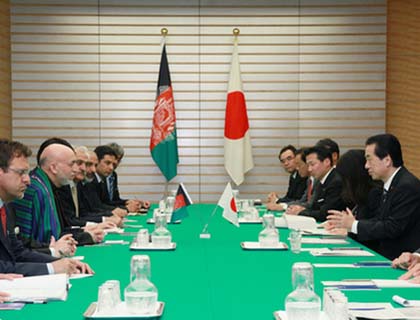With the Bonn II Conference on Afghanistan over with limited dividends to show for it, Afghanistan is yet again gearing up for another international conference. In July of this year, governments, international organizations and other major donors will meet in Tokyo, Japan and will discuss and take on financial commitments for a ten year period after 2014.
Without generous assistance of the international community, Afghanistan virtually stands no chance of success in the critical period after the withdrawal of most of the foreign forces in 2014. Sustaining and building on the gains achieved in Afghanistan so far is a must and the international community, knowing this all too well, on the one hand proclaims continued commitment to Afghanistan and, on the other hand, looks with hesitation as many of the countries and governments are clearly not satisfied with the pace and extent of the progress made in Afghanistan.
The financial commitment of donors to Afghanistan extends until the end of 2014 as agreed upon in previous donor conferences. Tokyo will be the place where these donors, governments and international organizations will take stock of the situation and will make it clear that, in actuality, to what extent they are still committed to the project of Afghanistan that started in 2001.
What will top the agenda in the upcoming Tokyo Conference will be the international commitment to Afghan National Security Forces. Afghanistan's military sector and maintaining its relatively large security forces are set to dominate the discussions at the Tokyo conference.
What is a cause for concern is that this centrality of security-military issues will overshadow another sector that is also crucial to the future of Afghanistan: development. The ANSF consisting of Afghan National Police and Afghan National Army, as of now, is set to grow to the tentative strength of 380,000 by the end of 2014 will be massive enough to gobble up to $7 billion a year.
This figure is impossible to be paid by the government of Afghanistan and the international contribution, in any case, will make up for the bulk of this figure. There are a number of questions that have to be answered in the run-up to the Tokyo Conference.
The final strength of the ANSF is still unknown. The tentative strength as said will be close to 380,000. There are strong indications that this number might indeed be revised down in line with new assessments made of Afghanistan's security needs over the next several years as well as the willingness and capacity of international donors to shoulder the financial burden of maintaining this massive force.
A U.S. military official in Afghanistan the other day remarked that the final numbers of ANSF might indeed be lowered as the government of Afghanistan, even after accounting for international assistance, will be unable to pay for this force strength that, compared to the size of Afghanistan's economy, is indeed huge.
The military sector, as discussed, will top the agenda at the upcoming Tokyo conference. What is unfortunate is that the other sectors that need international attention might be neglected or accorded a lower priority. Afghanistan's development challenges, the financial requirements of sustaining Afghanistan's economic growth and such important sectors as infrastructure development, rehabilitation of Afghanistan's agriculture sector and most importantly, political development might indeed end up neglected by the international donors.
It goes without saying that upholding the cause of rebuilding Afghanistan will prove a mirage unless a reasonable balance is struck between Afghanistan's security needs and its developmental imperatives. The ongoing unfortunate trend is predicated on an unsustainable focus on Afghanistan's security sector while development and aiding Afghanistan's economic growth takes the back seat.
The futility of this approach becomes yet more evident when we acknowledge the fact that, in the long run, it will be growth, development, jobs, livelihoods, employment and economic prosperity that will determine the final outcome. Without realizing these imperatives, the ongoing single-minded focus on Afghanistan's security sector will prove largely ineffective.
Therefore, the Tokyo Conference will be sensitive for Afghanistan. The international community and the governments of U.S. and other major donors would be well-advised to take into account the larger picture and view the Afghanistan issue in a long-run rather than just focusing on political expediencies and short-run objectives.
Many foreign governments and major donors to Afghanistan are hesitant to some extent as to whether or not push ahead with full force with the semi-finished project of building Afghanistan anew. The continued struggle of the government of Afghanistan to get back on its feet, the abysmal security situation, and the prospect of loss of much of the hard gains made over the past decade indeed make some of the donors and partners of Afghanistan despair and have second thoughts.
The Tokyo conference might indeed meet with a lukewarm response of international donors. The ongoing crisis situation in many economies particularly in the Eurozone and the U.S. will tie the hands of these donors. The financial commitments and pledges made at the upcoming Tokyo conference might be generous but it is not clear whether the donors will indeed make good on their promises of aid over this ten year period.
A significant segment of the aid pledged in previous conferences has not been forthcoming. Taking this into view and the fact that the road ahead of Afghanistan will be rocky and extremely difficult, we cannot count on these foreign donors to make good on the entirety of their financial pledges.
The international community, the government of Afghanistan and the government of the U.S., as Afghanistan's most important partner, should deliver on the imperative of striking a reasonable balance between Afghanistan's security needs and its developmental requirements. Thus far, all indications imply that the security needs will top the agenda. This is unfortunate and the government of Afghanistan should persuade the international community including the U.S. government to deliver on this imperative.

